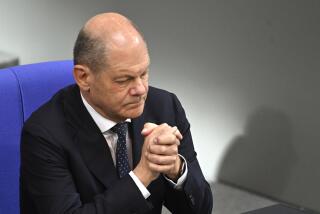German Leaders Discuss Fiscal Impasse
- Share via
BONN — The cream of Germany’s political leadership convened for an extraordinary meeting Friday to resolve the long-festering issue of financing the staggering costs of rebuilding the former Communist east.
The meeting at the federal chancellery, chaired by Chancellor Helmut Kohl and attended by leaders of the country’s mainstream political parties, the minister presidents (governors) of all 16 federal states as well as industry and trade union executives, follows months of bickering, indecision and drift.
A similar lack of progress in resolving other key issues has severely tarnished the image of all mainstream parties and turned the ability to achieve an agreement of any kind into a kind of de facto test for the German political process. Some political figures have said that the outcome will determine the future of German federalism; others claim the credibility of German democracy is at stake.
“If we don’t accept our responsibility, then dangers could arise for economic development and the internal stability of our federal democracy,” Finance Minister Theo Waigel said earlier this week.
In fact, there is only one real question of substance: Who is going to pay the bill, presently pegged at $67 billion annually?
While the meeting is scheduled to end later today, Kohl has threatened to keep all participants locked in the chancellery for as long as it takes to resolve the impasse.
The battle lines run in a bewildering series of directions.
For example, Kohl, who has already been forced once to break his 1990 election pledge of no new taxes, wants to fill the budget gap through a mixture of additional borrowing and cuts in social benefits. The opposition Social Democrats are demanding that new funds be raised by taxing those in higher income brackets.
Because the Social Democrats control the upper house of the German Parliament, known as the Bundesrat, their approval is crucial to any agreement.
Aside from these differences, heated debates have also unfolded on two other fronts: between the richer western states and their poorer eastern counterparts over how much money actually is required, and between the federal and state governments over how much of the money should come from state coffers and how much from the national purse.
Late Friday, hints of compromise surfaced on at least one front: Kohl indicated his readiness to drop a demand that unemployment benefits be cut.
But a number of thorny issues remain, and some predicted that the meetings could go into next week.
“It’s very hard to see how such fundamental differences can be buried in just two days,” said government spokesman Dieter Vogel.
More to Read
Sign up for Essential California
The most important California stories and recommendations in your inbox every morning.
You may occasionally receive promotional content from the Los Angeles Times.













